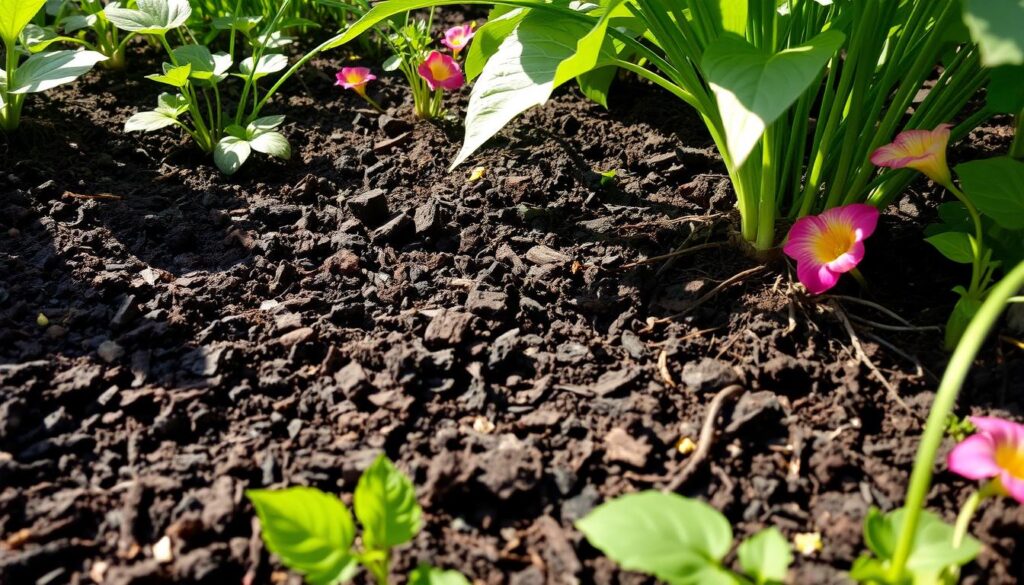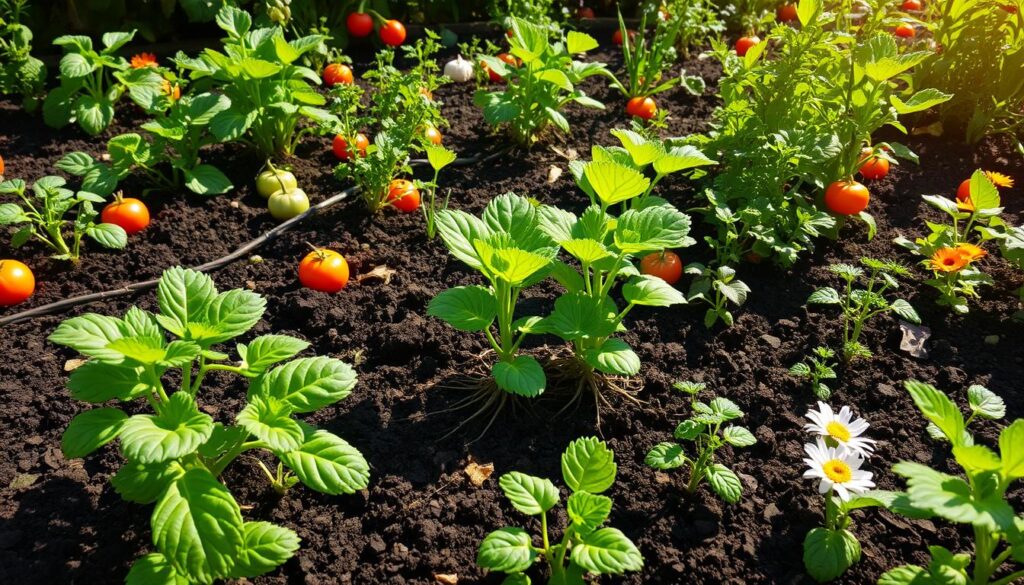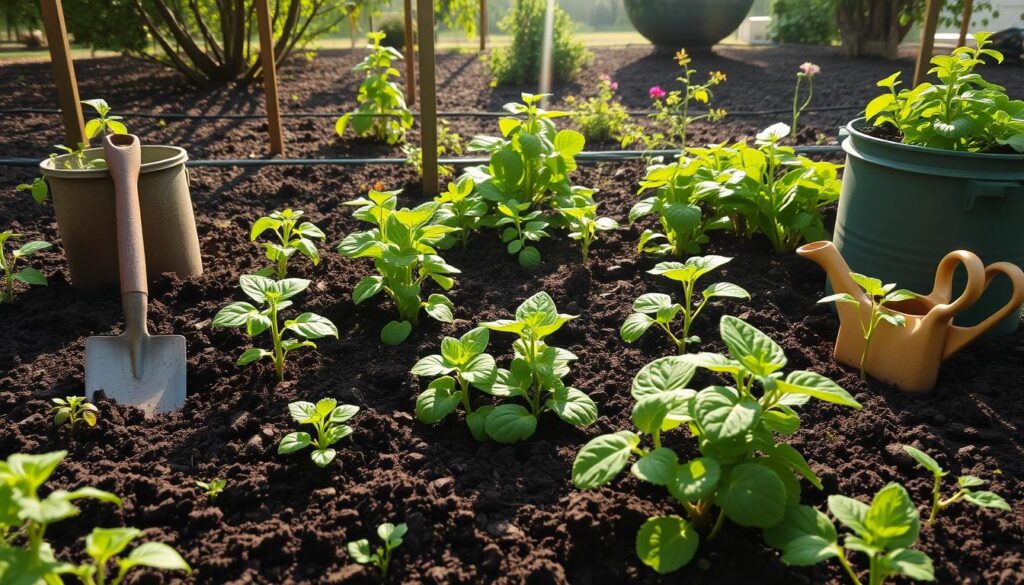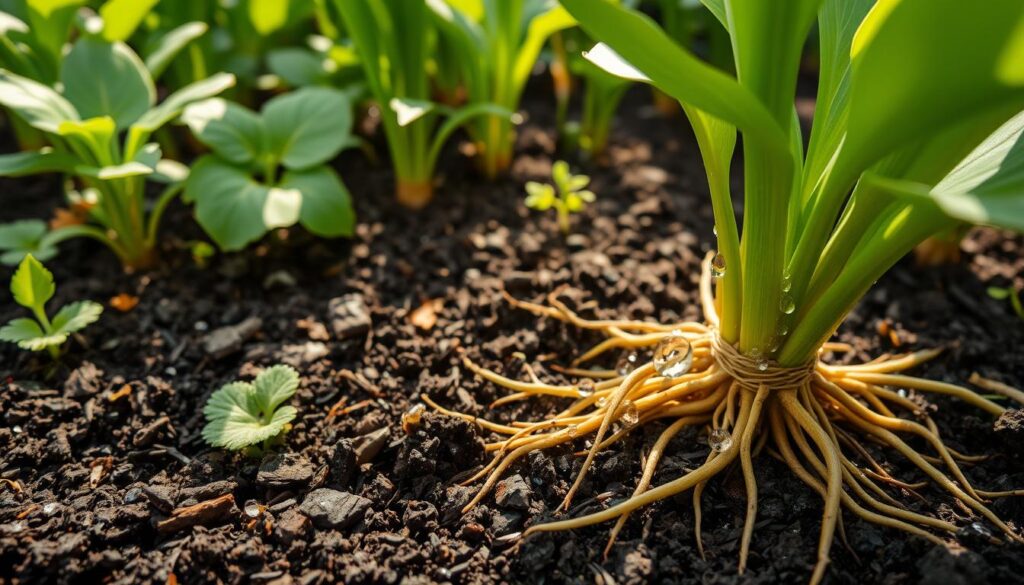Gardeners are always looking for ways to make their soil better. Biochar, an ancient method, is getting a lot of attention. It’s been used for centuries, including in the Amazon rainforest, to make gardens healthy and strong. By using biochar, we can make our soil better and follow old gardening ways for a greener future.

Using biochar in gardening is easy but very effective. It helps make the soil better in many ways. It improves the soil’s structure and helps with the growth of tiny living things in the soil. Biochar is a great tool for gardeners who want to take care of the soil and make it healthier.
Key Takeaways
- Biochar is a natural and effective way to improve soil health and fertility
- It has been used for centuries in various parts of the world, including the Amazon rainforest
- Biochar can enhance modern soil health and support sustainable gardening practices
- Gardening with biochar can promote soil wellness and support microbial activity
- It is a simple yet powerful way to create a thriving and healthy garden
- Biochar in gardening can help adopt ancient gardening techniques for a better tomorrow
- It supports sustainable gardening practices for modern gardeners
The Ancient Origins of Biochar: Terra Preta and Historical Uses
Biochar, a key organic soil amendment, has ancient roots. Terra Preta, a soil in the Amazon rainforest, reveals biochar’s past. This soil is full of biochar, boosting soil fertility for centuries.
For ages, biochar has been a biochar soil conditioner in gardening. Learning from its history, we see its biochar benefits for soil. It helps in today’s gardening, like biochar application in gardening.
Discovery in Amazon Rainforests
The Amazon rainforest holds Terra Preta, a biochar-rich soil. This find has deepened our understanding of biochar’s history. It shows its value as a biochar soil conditioner.
Traditional Agricultural Practices
For a long time, biochar has improved soil fertility in farming. By using these old methods, today’s gardeners can see the biochar benefits for soil. This boosts their garden’s health.
Understanding the Science Behind Biochar’s Effectiveness
When we talk about organic gardening with biochar, it’s all about how it makes soil better. It helps soil hold more nutrients and supports tiny life forms in the soil. By adding soil amendment biochar, gardeners can make their soil more fertile and sustainable. The biochar benefits are many, and knowing how it works helps gardeners use it best.
The way enhancing soil fertility works with biochar is fascinating. For instance, biochar can:
- Improve soil aeration and water retention
- Increase the availability of essential nutrients
- Support the growth of beneficial microorganisms
By adding biochar to their gardening, people can make their gardens healthier and more vibrant. As scientists learn more about biochar benefits, it’s clear that this old method is very useful in organic gardening with biochar.

Whether it’s as a soil amendment biochar or to boost soil fertility, the science backing biochar is strong. By using this natural and green gardening method, people can grow healthier, more productive gardens that last for years.
Biochar in Gardening: Ancient Techniques for Modern Soil Health
Gardening with biochar is an old method that’s now popular again. It boosts soil health in many ways. It makes soil better, adds nutrients, and helps microbes grow. This method is good for the planet too.
Using biochar in gardening has many benefits. It helps microbes, holds water, and keeps soil temperature right. You can make biochar in different ways to fit your garden needs. Adding it to compost makes soil even more fertile.

Chemical Properties and Soil Interaction
Biochar changes how soil works for the better. It helps keep nutrients in the soil for plants. This is key for making soil healthier and is done with biochar.
Microbial Activity Enhancement
Biochar is home to good microbes, which are vital for soil. It helps break down organic matter and makes minerals available. This keeps soil healthy and is helped by using biochar in gardening.
| Benefits of Biochar | Description |
|---|---|
| Soil Structure Improvement | Biochar improves soil structure, making it hold water better and breathe easier. |
| Microbial Activity Enhancement | Biochar is a home for good microbes, boosting microbial activity and soil health. |
| Water Retention Capabilities | Biochar keeps water in the soil, cutting down on watering and soil erosion. |
Essential Benefits of Biochar for Garden Soil
Adding biochar to your garden can bring many biochar benefits for plants. It makes the soil more fertile and helps plants grow better. Knowing how to use biochar in the garden is key to getting the most out of it.
Biochar is great for making soil better. It helps gardeners use fewer fertilizers and pesticides. This makes gardening more eco-friendly. Some main perks of using biochar include:
- Improved soil structure and water retention
- Increased microbial activity and nutrient availability
- Reduced soil erosion and nutrient leaching
Used right, biochar is a natural way to boost soil health and plant growth. Learning about its benefits and how to use it can make your garden flourish. This way, you can have a healthy and green garden.

Modern Production Methods and Quality Standards
The demand for biochar is rising, leading to new production methods. These methods are key for sustainable agriculture and improving soil health. Biochar can be made through industrial techniques and home methods.
Industrial production uses big equipment and facilities to make biochar. It’s good for making lots of biochar and can save money. Home production, on the other hand, uses simple tools and is smaller in scale. The choice depends on what the producer needs.
Quality standards for biochar are very important. They check the carbon content, pH level, and if there are contaminants. Knowing about production methods and quality helps gardeners choose the right biochar. Using biochar in gardening supports sustainable agriculture and helps the environment.
| Production Method | Advantages | Disadvantages |
|---|---|---|
| Industrial Production | High-volume production, cost-effective | Requires large-scale equipment and facilities |
| Home Production | Small-scale, low-cost, easy to implement | Limited production capacity, may not be as cost-effective |
Practical Application Methods in Your Garden
There are many ways to use biochar in your garden. You can add it to the soil, mix it with compost, or use it as mulch. This makes biochar a great tool for modern soil health practices. Using biochar can make your soil better and help plants grow stronger.
To manage soil well, knowing how to apply biochar is key. You can blend it into the soil, add it to compost, or spread it as mulch. Mulch helps keep soil moist and weeds away. Biochar also boosts biochar for plant growth by holding more water and supporting good microbes.
Using biochar in your garden has many benefits. These include:
- Soil that’s better structured and fertile
- Soil that holds more water and is more drought-resistant
- Soil with more microbes and healthier plants
By using these methods, you can make your garden more sustainable and productive. It also helps the environment. Always follow the right application steps and start small for the best results for your plants and soil.
Environmental Impact and Carbon Sequestration
Using biochar to improve soil fertility is good for the environment. It helps gardeners use old farming ways to make soil better. Biochar also locks carbon in the soil, which helps fight climate change.
Adding biochar to soil cuts down on harmful gases. It also means less need for harmful fertilizers. This makes the soil healthier and more fertile. Gardeners get better crops and help the planet at the same time.
Long-term Carbon Storage Benefits
Biochar is great because it keeps carbon in the soil for a long time. This helps lower harmful gases in the air. Gardeners using biochar help the planet and support green farming.
Reducing Greenhouse Gas Emissions
Gardeners using biochar and old farming ways cut down on harmful gases. This helps fight climate change and makes soil and crops better. As we move to greener farming, biochar will become even more important.
| Soil Health Benefits | Environmental Impact |
|---|---|
| Improved soil fertility | Reduced greenhouse gas emissions |
| Increased crop yields | Promotion of sustainable agriculture practices |
| Enhanced soil structure | Long-term carbon sequestration benefits |
Future Perspectives: Biochar in Sustainable Agriculture
The world is moving towards more green practices, and biochar is key in this shift. It boosts soil health and helps lock in carbon in soil. This reduces harmful emissions and makes gardens greener.
Biochar’s role in organic gardening is huge. It improves soil life, holds water better, and helps plants grow. As we move towards greener farming, biochar use will grow. This will cut down emissions and help carbon sequestration in soil.
To get the most from biochar, we need more research and its use in green farming. This will help us achieve a greener future for gardening and farming.
Conclusion: Embracing Ancient Wisdom for Tomorrow’s Gardens
As we wrap up our look at biochar, it’s clear it’s a game-changer for today’s gardeners. It can make soil better, more fertile, and help gardens grow strong and green. Biochar does many good things, like keeping soil moist and trapping carbon to fight climate change.
Using biochar in gardening connects us to the past while solving today’s environmental problems. It helps soil get better, supports tiny life in the soil, and helps our planet. This way, gardeners can make their soil better and help the earth.
The push for green farming and eco-friendly gardening is getting stronger. Biochar’s role in this movement will grow. By learning about biochar, gardeners can make better choices. They can help their gardens and the planet thrive.
FAQ
What is biochar and how is it used in gardening?
Biochar is a type of charcoal that boosts soil health and fertility. It’s been used for centuries, including in the Amazon rainforest. Today, it’s used as a soil amendment, compost additive, and mulch in gardening.
What are the ancient origins and historical uses of biochar?
Biochar’s use goes back to ancient times, found in the Amazon rainforest and elsewhere. Terra preta, a soil type in the Amazon, is rich in biochar. It’s been used for centuries to make soil more fertile. Learning from its history helps us understand its benefits for modern gardening.
How does biochar work to improve soil health and fertility?
Biochar enhances soil health and fertility in several ways. It improves soil structure, makes nutrients more available, and supports microbes. These benefits make it a great choice for gardeners today.
What are the essential benefits of using biochar in the garden?
Biochar boosts soil fertility, increases crop yields, and cuts down on fertilizer and pesticide use. Adding biochar to the soil helps create a thriving, healthy garden.
How is biochar produced and what are the quality standards?
Biochar can be made through industrial or home methods. Knowing how it’s produced and the quality standards is key for gardeners. It helps them choose the right biochar for their garden.
How can biochar be applied in the garden?
Biochar can be used in several ways, like as a soil amendment, compost additive, or mulch. Understanding how to apply it is important. It helps gardeners use biochar effectively to improve soil health and fertility.
What are the environmental benefits of using biochar?
Biochar can reduce greenhouse gas emissions and support sustainable agriculture. It has the power to sequester carbon and enhance soil health. These benefits make it a key player in sustainable agriculture.
What is the future of biochar in sustainable gardening and agriculture?
As we move towards more sustainable practices, biochar’s role in agriculture will grow. It can help reduce emissions, improve soil health, and make gardens more sustainable. Biochar is set to play a big part in our future gardening and agricultural practices.




